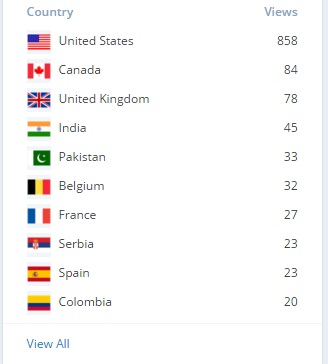
On the past four Mondays — Oct. 26, Nov. 2, Nov. 9 and Nov. 16 — the PP Blog averaged viewership from 32 countries, according to a compilation of data from Jetpack summarized by the Blog. These numbers are typical. On any given day, viewers from between 25 and 40 countries arrive here.
But on Oct. 19 — also a Monday and the day the Blog reported that a criminal investigation involving the Payza and Obopay payment processors was under way — the Blog’s viewership shot up to 76 countries. That’s nearly 40 percent of the nations in the world. Viewers from other countries followed Payza- and Obopay-related content in subsequent days, suggesting that people in an even higher percentage of the world’s nations are concerned about the probe.
As the Blog reported on Oct. 21, the targets of the investigation are unclear and much info has been redacted from public filings.
The Blog is reporting today that Payza’s name again has appeared in a filing by the court-appointed receiver in the 2012 Zeek Rewards’ Ponzi- and pyramid scheme case. The filing was dated yesterday and includes these lines (italics added):
The Receiver Team continues to investigate and pursue outstanding funds from Payza, Payment World, Solid Trust Pay, and Cyberprofit and is working with various government agencies and McGuireWoods Consulting in pursuit of these assets.
Millions of dollars tied to U.S.-based Zeek may be in Moldova, according to receiver Kenneth D. Bell. Moldova is a neighbor to Ukraine, a world hot spot described by the Financial Times as “war torn.”
Payza, its predecessor AlertPay and SolidTrustPay are Ponzi-forum darlings operating in an era of almost unimaginable cross-border fraud that frequently has an MLM or direct-sales component. The numbers are truly staggering — so high that agencies such as the U.S. Department of Homeland Security and the FBI have become involved in investigations.
Money moves across borders in a flash these days, including the borders of nations under terrorist threat. Perhaps especially in the HYIP sphere, the aims of the “program” operators and the identities of the recipients of the cash may be particularly murky.
Information filed by the U.S. Postal Inspection Service in the 2010 “Pathway To Prosperity” case alleges the P2P scheme spread to at least 120 countries, “all of the permanently inhabited continents of the world” and cost investors losses in 48 of the 50 U.S. states.
Though uncharged, AlertPay and SolidTrustPay both are referenced in the P2P case, as well as the AdSurfDaily case from 2008. Ponzi forums such as TalkGold and MoneyMakerGroup also are referenced in U.S. filings.
The office of U.S. Attorney Channing D. Phillips of the District of Columbia says it expects to release more information on the Obopay/Payza matter “shortly after” Jan. 22, 2016.
NOTE: Our thanks to the ASD Updates Blog.
Comments
3 responses to “STATS: High Interest Globally In Criminal Probe Involving Payza And Obopay”
Perhaps related to scammers payment systems
http://www.theregister.co.uk/2015/11/18/ftc_zaps_more_scammer_loopholes/
Ponzi scammers often promote “prepaid cards” as a way of furthering their criminal activities. Maybe the new rules will help.
Thanks for this, Tony. Here is the FTC’s statement:
https://www.ftc.gov/news-events/press-releases/2015/11/ftc-amends-telemarketing-rule-ban-payment-methods-used-scammers
Patrick
So many people will loose money in the nearer future when Payza fail. I will bet it’s cybermonday or cyberfriday it will happen.